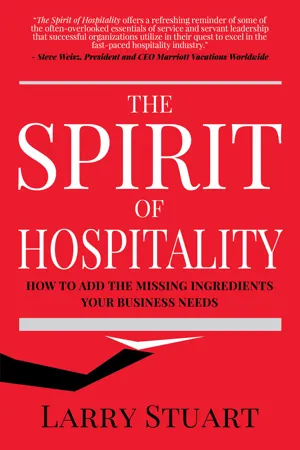![]()
Building the Spirit of Hospitality
In this ever-changing society, the most powerful and enduring brands
are built from the heart. They are real and sustainable.
Their foundations are stronger because they are built with the strength
of the human spirit, not an ad campaign.
The companies that are lasting are those that are authentic.
- HOWARD SHULTZ
A clear definition of our corporate culture sets the stage for the entire hospitality program. What does our company stand for? Can we clearly present that to our team members? Does everyone recognize it from the CEO all the way down to the busser or the sanitation engineer? It’s very important for the spirit of hospitality to be central to the company’s culture so everyone who experiences the company’s service—from leadership to guest—will recognize it as soon as they interact with someone from our organization.
If our team members don’t know or agree with our corporate culture, they will always make mistakes or buck the system. Our values need to stand out. We need to reinforce them with our actions, our words, and our reactions. Just like our mission statement, we need to eat, sleep, and breathe our spirit of hospitality culture.
Consider Trader Joe’s, Southwest Airlines, and Chick-fil-A. What’s their culture? It’s their pleasure to serve others. You’ll rarely see a frown when you walk to the counter. Their team members smile. When a guest calls in with a question or concern, he can hear that smile through the phone. They enjoy working. They ask for a guest’s name and then respond with it, making us feel very special when engaging with them. People aren’t just the next check adding to their cash flow. We are individuals with individual needs, and they recognize that. The environment is relaxed, welcoming, and kindness oozes from every fiber of the team. Their entire hospitality production works because every team member understands and agrees with their corporate culture—or they wouldn’t have been hired in the first place.
We need to be sure to hire team members who will serve our culture to our guests. They will either have the spirit of hospitality, or they won’t. It’s the responsibility of our HR team to protect the value of our culture through the vetting process. Throughout my career, I’ve always hired a smile first, a positive attitude second, and a willingness to do whatever it takes third. We can train skill sets, but we can’t train the spirit of hospitality. Our goal is to bring our entire operation to a level of service that our guests deserve.
At Texas Roadhouse, they consider one another to be family. “We take care of each other.” They promote a culture of flexible work schedules in order to balance work and home life. If someone needs to work from home, they try to accommodate that. The heart and soul of their culture is their core values of passion, partnership, integrity, and fun—and all of those have a purpose.2 Like Texas Roadhouse has done, we need to create a culture our team members will find value in and appreciate. When we do so, turnover decreases and productivity, morale, and commitment increase.
Vision and Mission
In 1962, President Kennedy was visiting NASA headquarters for the first time. While touring the facility, he introduced himself to a janitor who was mopping the floor and asked him what he was doing. He replied, “Well, Mr. President, I’m helping put a man on the moon.”
Good companies possess a strong sense of what they’re all about and communicate that purpose to each and every team member. People in today’s workforce need to know they’re contributing to something meaningful. Within the next twenty years, the millennial generation will comprise the majority of the workforce. Millennials want to know that they are serving a greater purpose in whatever they put their hands to do. Without a strong mission statement, our team won’t know why they’re working from nine to five every day. That will lead to turnover, because they won’t stay in a position they’re not passionate about. Give them a sense of meaning by pointing them toward your mission statement.
If our people don’t feel as if they’re part of the recipe of our company or know the direction they’re supposed to go—the mission of the company—they will never become committed to working as if they are stakeholders and will find themselves going in circles. Eventually, they will quit. Our company’s mission statement is the compass team members will turn to for direction. What’s the company’s center? That’s the direction people usually miss. We understand North, South, East, and West. But what’s at the center of those directions? If our team members know what the center focus is, they can make wise decisions concerning varying aspects of their jobs based on that center focus. And that’s when we find corporate success. Everyone in our company should have one collective mission that puts us working toward one goal. Whether the team member is part of the maintenance staff, food and beverage, or housekeeping or they are part of the IT staff, marketing, or the executive team, he or she should know they are an important part of achieving the mission statement’s goal through their individual efforts.
Have you ever seen video footage of Southwest’s flight attendants “performing” their pre-flight instructions to the passengers? Do you have room in your seat on a full Southwest flight? Are their boarding times shorter and sweeter than those of other airlines? If you answered yes to all or even most of these questions, then you know they’re living up to their mission statement. Their team members are effectively working as a team and creating a fun environment for their guests to enjoy.
The key to the success of your company, whether it be the accomplishments of your team members, successfully satisfying guests, or the success of your overall return on investment is dependent on your mission statement and everyone’s ability to achieve that mission. There are several ways to get that mission statement in front of your team:
- Talk about it every chance you get. It needs to be communicated multiple times on a daily basis. Bring it up during morning meetings, conferences, and staff reviews.
- Include it in your email signature.
- Post it in the staff break room.
- Find creative ways to comment about it in general conversations with team members.
Everyone who works for our company needs to eat, sleep, and breathe it. When it’s internalized, our team members will serve our guests successfully out of a natural desire to fulfill our corporate mission, thus improving our bottom line.
Finding Success in the Hospitality Industry
We have all been blessed with talents and a purpose in life. In the hospitality industry, our passions include but are not limited to serving others, smiling, welcoming others into our establishments and homes, helping others by exceeding a need, entertaining, encouraging, making others feel good despite their circumstances, and offering a little more. If we aren’t passionate about a life of service, then we’re in the wrong industry and need to consider a career change. If we want to pursue a career in the hospitality industry, then we need to ignite a passion within our careers. Once that passion is in play, there are three keys to achieving success:
- Success always starts with a plan.
- Success requires commitment.
- Surround yourself with people who share your values.
Success Always Starts with a Plan
Success always starts with designing a plan and then following through with it. A blueprint to build a career from the ground up. When we are building hotel or restaurant brands, we need to know every detail from the critical path time frame, feasibility study, budget, business plan, and labor requirements to the design criteria, Furniture Fixtures & Equipment, materials, menu, and so much more. And in order to know these things, we need to have an intimate knowledge of today’s business demand that we’re passionate about.
I spent many years helping to design and build restaurants. In the 1990s, I was hired to participate in the design development of the twelve Walt Disney World Dolphin restaurants and lounges, working alongside Tishman Construction, who built Walt Disney World, the World Trade Center, and many other behemoth projects. One cannot find success in such massive projects without having and executing a solid business plan. And to create that viable plan, you have to know your business inside and out.
Prior to the Walt Disney World Dolphin, I led operations building teams in over twelve restaurants. My friend, partner, and hotel mentor, Octavio Gomez, remembered how I had served him in the entertainment business in the 1970s. Octavio was Regional Director of Food and Beverage on the East Coast for Sheraton Corporation. When he was offered the opportunity to become the resident manager of the Walt Disney World Dolphin, because of our previous business relationship, he knew I was the perfect fit to provide an entertainment/hospitality leadership flair. As Director of Restaurants, I provided the necessary development support with the themes, the story lines, the service style for each restaurant, culinary direction and menu planning.
What did the plan require? First, a committed willingness to take the position. This was the career move that paved the way for my future success. Second, it took pure creativity. I saw what each space could be because of the opportunities previous jobs I’d held had presented. The story for each restaurant had to come first. Then, we hired and trained the staff. The guest experience had to be above and beyond the rest—better known as Disneyesque. My entertainment background combined with my schooling at Cornell and subsequent hotel/restaurant experience gave me the credentials and ability to execute at the highest level of performance.
Success Requires Commitment
Coming up with and executing a plan doesn’t only require vision and knowledge. It also requires the total giving of one’s self in all that we commit to. We have to give to get, and we have to work to eat. We must be fully involved and fully invested. If we aren’t, an area of our foundation is going to be weak, which could tumble the entire operation. When we aren’t fully involved, it leaves room for mistakes, and in this business of building a kingdom, mistakes are costly.
Servant leaders have skill sets that are foundational to their position: planning, organization, and adm...









